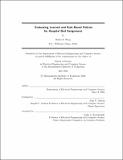Evaluating Learned and Rule-Based Policies for Hospital Bed Assignment
Author(s)
Wong, Hallee E.
DownloadThesis PDF (9.194Mb)
Advisor
Guttag, John V.
Terms of use
Metadata
Show full item recordAbstract
In many complex sequential decision making problems in healthcare such as hospital bed assignment, resources are limited and shared between patients. Hospital bed assignment is an important decision making problem because a patient's bed assignment influences their medical outcomes, including their risk of developing a healthcare associated infection (HAI). In this thesis, we consider the problem of assigning patients to hospital beds with the goal of reducing the incidence of HAIs. We propose a two part approach to this task: first, use reinforcement learning to learn a function from logged data for assessing different patient and bed pairs, then use this function to design policies for sequentially assigning batches of patients to beds. We develop a simulation to demonstrate this approach and conduct experiments exploring how assumptions about the environment affect the performance of learned and rule-based policies. We examine the performance of weighted importance sampling for off-policy evaluation. Our results show that policies that prioritize patients with the highest risk of poor outcomes outperform purely greedy policies.
Date issued
2022-05Department
Massachusetts Institute of Technology. Department of Electrical Engineering and Computer SciencePublisher
Massachusetts Institute of Technology